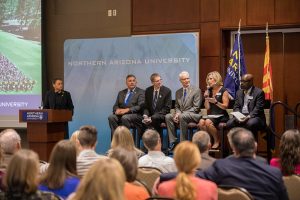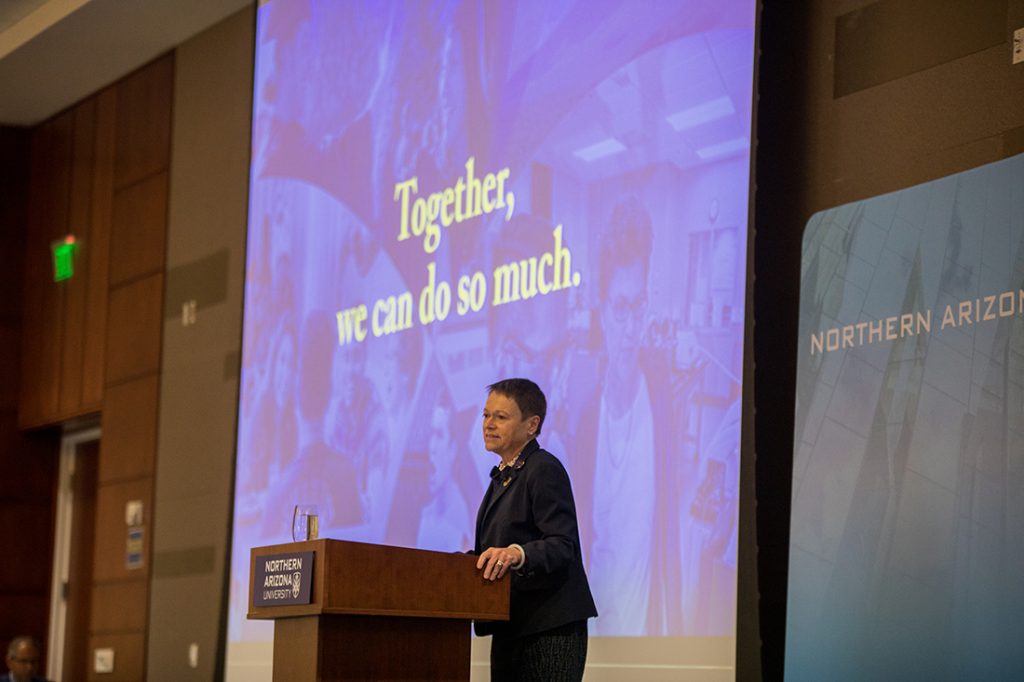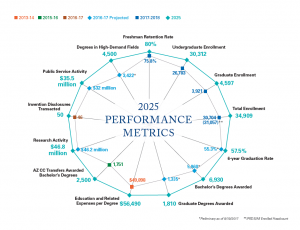By Heidi Toth
NAU Communications
NAU is moving in the direction we want to go, making good progress, Northern Arizona University President Rita Cheng told faculty, staff, students and Flagstaff community members at the Fall Campus Forum Wednesday. But we still have plenty of work to do to get there.
“We must continue to enhance our accessibility and connection to more students around the state,” she said. “We must do a better job of telling Arizonans that we are there for them, ready to offer a wide range of options and opportunities and dedicated to working together to achieve excellence.”
At the forum, Cheng discussed a broad range of topics, including NAU’s research funding and presence on the national and international scale; enrollment, tuition and ways to help NAU students achieve success; and the innovations in research, in the classroom and throughout campus in which faculty and staff members engage to improve the university.
“Our high-quality, student-focused NAU team leads us to new opportunities every day,” she said. “Together we prepare our students to thrive—not just in their careers, but in their lives. We are tackling the world’s greatest problems and possibilities, and we are doing it together.”
Cheng started on a somber note, recognizing the disasters that have affected the world and the NAU community, highlighting a number of students and organizations who have responded to recent tragedies: Lynnae Zgurich, who organized a blood drive after the Las Vegas massacre; and the NAU Campus Ministry Center, which coordinated a donation drive to help Puerto Rico residents after the island was devastated by Hurricane Irma. She also mentioned groups who routinely provide help closer to home, including the Service Professional Advisory Council and the Classified Staff Advisory Council, which is in the middle of its winter clothing drive.
“Through good and tough times, our Lumberjack family works together to lead toward a brighter future for our university and our state,” she said. “We are a team, joined by our desire to transform lives and educate minds.”
NAU’s numbers continue to improve. Enrollment is growing, including online and in Personalized Learning programs and in graduate and undergraduate programs in Flagstaff and throughout the state. First-year retention is 75.8 percent, one step closer to the goal of 80 percent. The university signed memoranda of understanding with four tribal colleges in Arizona to help Native American students transition to a four-year-college and is making progress toward becoming a Hispanic serving institution.

As those numbers have increased, so have NAU’s offerings. The university has added programs in parks and recreation management, social work and other programs, as well as increasing the offerings available at campuses statewide and through online education.
“This growth means increased access for individuals who do not have the benefit of living in a college town, and for those who cannot leave other obligations to pursue an on-campus experience,” she said. “It means more career options and more dreams made possible.”
All of these outcomes—higher first-year retention, incoming classes with higher GPAs, more students taking advantage of mentoring programs, student organizations, study abroad and research opportunities—contribute to NAU’s primary goal of more students earning their degrees.
But that degree needs to do more than hang on graduates’ walls; it needs to prepare students for the demands of their industry and the workforce today. NAU professors and administrators are continually working to fine-tune degree programs, encouraging internships, connecting students with people in their industries and teaching a curriculum that addresses the ever-changing nature of the working world today.
Cheng cited NAU’s partnership with North Country Healthcare to provide hands-on training in dental hygiene, nursing, physical therapy, social work and community engagement; research collaborations with TGen and the Flinn Foundation, which allow faculty and students to study real-world problems; and partnerships with school districts to have education students in classrooms teaching almost from day one.
Though more work remains to be done, the effects of such focus are clear. Cheng highlighted the 100 percent employment placement rates for graduates from a number of health care programs at the Phoenix Biomedical Campus and the interest in NAU Teachers’ Academy.
Faculty success

NAU continues to attract professors who are on the cutting edge of research in their fields and bringing that expertise into the classrooms. NAU’s researchers are among the most quoted in the world; a recent survey gave the university a score of 91.6 in citations, which is the top 10 percent worldwide. Faculty members continue to present research at conferences throughout the globe, lending expertise and adding knowledge to their fields of study.
NAU’s research and development expenditures have tripled in the last 15 years; this year the university will have $46 million in research expenditures, which ranges from the study of health disparities, environmental changes, the development of volcanoes and Valley fever. That puts NAU on par with the top 200 research institutions in the United States, a group the university will soon be part of, Cheng believes.
This research success builds on itself, helping to attract more faculty members and graduate students who continue to pursue new knowledge, develop patents and solve problems facing the world today.
“I am grateful to the faculty who have dedicated their great knowledge and skills to the new opportunities that come from our increasing focus on research,” Cheng said. “Discovery gives us the findings we need to better address the problems facing the world and inspires us to reach into the unknown to develop solutions to those problems.”
Cheng also mentioned key staff searches, including a dean for NAU Online and Innovative Educational Initiatives, a special adviser to the president on diversity and inclusion and a community liaison, as well as structural additions, such as the coming Northern Arizona College Resource Center, a collaboration with the Yavapai County School Superintendent and the Yavapai County Education Service Agency.




